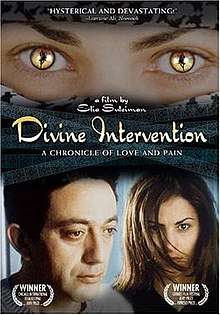Divine Intervention (film)
| Divine Intervention | |
|---|---|
 | |
| Directed by | Elia Suleiman |
| Produced by |
Humbert Balsan Elia Suleiman |
| Written by | Elia Suleiman |
| Starring |
Elia Suleiman Manal Khader |
| Distributed by | Avatar Films (USA) |
Release date | May 19, 2002 |
Running time | 92 minutes |
| Country |
France Morocco Germany Palestinian territories |
| Language |
Arabic Hebrew English |
Divine Intervention (Arabic: يد إلهية) is a 2002 film by Palestinian director Elia Suleiman, which may be described as a surreal black comedy. The film consists largely of a series of brief interconnected sketches, but for the most part records a day in the life of a Palestinian living in Nazareth, whose girlfriend lives several checkpoints away in the West Bank city of Ramallah.
One lyrical section features a beautiful sunglasses-clad Palestinian woman (played by Manal Khader) whose passing by not only distracts all eyes, but whose gaze causes Israeli military checkpoint towers to crumble. The director features prominently as the film's silent, expressionless protagonist in a performance that has been compared to the work of Buster Keaton, Jim Jarmusch and Jacques Tati.[1][2]
The film is noted for its minimal use of dialogue, its slow pace and repetition in behavior by its characters.
Cast
- Elia Suleiman as E.S.
- Manal Khader as The Woman
- Denis Sandler Sapoznikov as Israeli soldier on Palestinian-Israeli border.
Oscar controversy
Despite being nominated for the "Palme d'Or" award at the 2002 Cannes Film Festival, the film's consideration as candidate for Best Foreign Film at the Academy Awards was an occasion for considerable controversy. In late 2002, producer Humbert Balsan authorized the US distributor of the film to release a statement which stated that Balsan had asked the Academy of Motion Picture Arts and Sciences if the film could run for best foreign language picture. According to Balsan, the answer was no, because "Palestine is not a state we recognize in our rules." However, spokesperson John Pavlik states that the Academy had never made a decision on that issue because Suleiman had never submitted his film. Critics like The Electronic Intifada and others, claim that the Academy did make a decision, and that it was based on political considerations.[3]
The film was considered for an Oscar the following year; Pavlik told Variety "The committee decided to treat Palestine as an exception in the same way we treat Hong Kong as an exception. It's always the goal of the foreign-language film award executive committee to be as inclusive as possible."[4]
Music
| Divine intervention | |
|---|---|
| Soundtrack album by Various Artists | |
| Released | September 30, 2002 |
| Genre | Soundtrack |
| Length | 52:27 |
| Label | Milan Music |
Elia Suleiman has used entirely non-original music of various genres and artists in the film. These include artists such as the Belgian singer Natacha Atlas, Indian composer A.R. Rahman, Lebanese electro-pop band Soapkills and Paris-based record producer Mirwais Ahmadzaï.
Track listing:
- "I Put a Spell on You" by Natacha Atlas — 3:44
- "Ana Oual Azab" by Mohammed Abdel Wahab — 9:01
- "Fingers" by Joi — 6:34
- "Easy Muffin" by Amon Tobin — 5:03
- "Wala Ala Baloh" by Amr Diab — 5:08
- "Les Kid Nappeurs Main Theme" by Marc Collin — 4:13
- "Tango El Amal" by Nour el Houda — 3:10
- "Mumbai Theme Tune" by A.R. Rahman — 5:14
- "Definitive beat" by Mirwais — 3:58
- "Tango" by Soapkills — 3:19
- "Dub4me" by Soapkills — 3:03
Awards
The film screened at the 2002 Cannes Film Festival on May 12,[5] was awarded the Jury Prize[6] and the FIPRESCI Prize for "its sensitive, amusing and innovative vision of a complex and topical situation and the tragic consequences that result from it".[7]
- Won
- Jury Prize at the Cannes Film Festival[6]
- FIPRESCI Prize (competition) at the Cannes Film Festival[6]
- Special Jury Prize at the Chicago International Film Festival
- Screen International Award at the European Film Awards
- Nominated
- Palme d'Or at the Cannes Film Festival[6]
- Best Non-American Film at the Bodil Awards
See also
References
- ↑ "A Little Something Divine". Archived from the original on 2005-02-26.
- ↑ "A Breakdown of Communication: Elia Suleiman Talks About "Divine Intervention"". Archived from the original on 2005-10-30.
- ↑ Doherty, Benjamin J. Abunimah, Ali. (2002). "Oscars' double standard turns Palestinian film into refugee". The Electronic Intifada. December 10. Last accessed: December 19, 2005.
- ↑ "Palestinian film joins Oscar race". BBC News. October 21, 2003. Retrieved January 2, 2010.
- ↑ "Release dates for Yadon ilaheyya". IMDb.com. Retrieved 2009-08-10.
- 1 2 3 4 "Festival de Cannes: Divine Intervention". festival-cannes.com. Archived from the original on 2011-08-22. Retrieved 2009-10-25.
- ↑ "Cannes Film Festival 2002". IMDb.com. Archived from the original on 2009-02-09. Retrieved 2009-08-10.